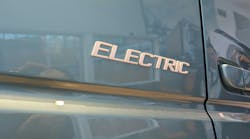The increasing market acceptance of advanced clean diesel technology heavy-duty trucks and passenger vehicles will play a major role in helping California achieve future fuel savings and climate objectives, according to new research presented by the Diesel Technology Forum (DTF) to the California Energy Commission.
"As California policymakers evaluate future transportation fuels and technologies, this new research underscores the key role for clean diesel technology in saving energy and reducing CO2 emissions in both passenger cars and heavy duty applications," Allen Schaeffer, the executive director of the Diesel Technology Forum told members of the commission.
"The importance of diesel technology to meeting California's climate and clean air goals is made possible by the inherent and proven energy efficiency of diesel, the transformation to clean diesel fuel and engine technology, and the significant penetration of diesel in key sectors of California's economy," continued Schaeffer.
Schaeffer made his comments during a presentation in late July to the California Energy Commission during the Joint Lead Commissioner Workshop on Transportation Energy Scenarios to discuss potential growth projections for alternative transportation fuels, vehicles and infrastructure and factors related to growth.
The workshop was designed to outline the expected contribution of biofuels, electric transportation, natural gas, hydrogen and other options to California's transportation sector.
DTF's presentation was based on research it commissioned by the Martec Group in June 2013.
Major fuel savings and CO2 reduction benefits come from the increasing use of new generation diesel engines used in heavy-duty commercial trucks, according to the new Diesel Technology Forum research. California has the third highest registration (20%) of the new generation (2007 and later) clean diesel commercial trucks (Class 3-8).
Since 2000, heavy-duty diesel trucks have been transformed to a near zero emissions state, with over 98% reductions in emissions of particulate matter (2007) and beginning in 2010, near-zero emissions of nitrogen oxides. The newest clean diesel heavy-duty trucks introduced from 2010-2012 make up 11% of all registrations and are achieving significant reductions in fuel use of 3-4% conservatively, resulting in savings of as much as 560 million gallons of fuel, or 13.3 million barrels of oil and 5.7 million tons of CO2 on a nationwide basis.
"The real-world 3-4% fuel savings of new 2010 and later MY clean diesel heavy-duty trucks is significant for several reasons, because of the energy intensity of heavy duty vehicles and because diesel engines are the technology of choice for over 90% of commercial trucks," Schaeffer said.
"Achieving these present gains in fuel efficiency while maintaining near-zero emissions is particularly notable,” he added, “because these are competing forces.
Heavy-duty truck and engine makers are also working toward meeting first-ever GHG and fuel economy mandates from EPA and NHTSA beginning in 2014 and in 2018."
In addition, Schaeffer noted that major U.S. and international energy studies from the National Petroleum Council and World Energy Outlook project diesel will continue to be the dominant fuel source for transportation for the next several decades.
In addition, ExxonMobil predicts that not only will diesel surpass gasoline as the number one global transportation fuel by 2020, diesel demand will also account for 70% of the growth in demand for all transportation fuels through 2040. ExxonMobil also projects that natural gas will remain only a small share of the global transportation fuel mix, at 4% by 2040, up from today's 1%.


